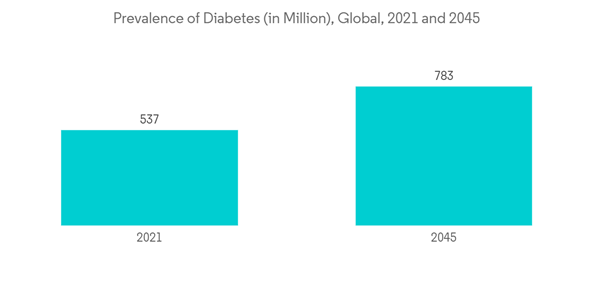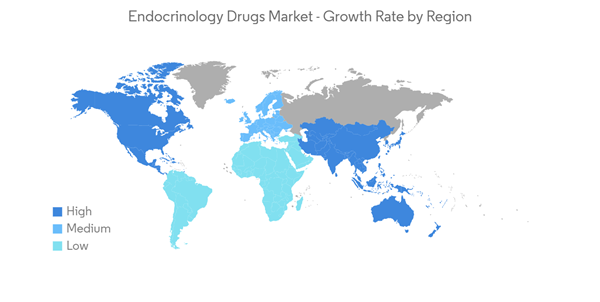Key Highlights
- COVID-19 significantly impacted the endocrinology drugs market since many research studies demonstrated that people with thyroid disorders and diabetes are more prone to COVID-19 infection, creating a significant demand for the appropriate use of various endocrine drugs. For instance, as per the mini-review published by Oxford University Press in January 2022, the transmembrane serine protease 2 (TMPRSS2) protein is required for the coronavirus to gain access to cells via the angiotensin-converting enzyme 2 (ACE2) receptor.
- Both ACE2 and TMPRSS2 proteins are expressed in several endocrine glands, including the pancreas, thyroid gland, ovaries, and testes. This indicated that the endocrine system is vulnerable to both destruction and alteration in function due to COVID-19. However, as the pandemic spread, in the post-pandemic situation, the market is likely to witness significant growth in the coming future due to the increase in endocrine diseases and the rise in new product launches.
- The major factors driving the growth of the market include an increase in the prevalence of endocrine disorders, a rising adolescent population with endocrine disorders, and extensive research and development. An increase in endocrine disorders, specifically diabetes, is one of the major factors driving the growth of the endocrinology drug market.
- According to the International Diabetic Foundation (IDF) 2021 update, approximately 537 million adults (20-79 years) were living with diabetes in 2021. The total number of people living with diabetes is projected to rise to 643 million by 2030 and 783 million by 2045. Thus, the rise in diabetes cases globally is likely to increase the demand for anti-diabetic drugs and thereby fuel the endocrinology drugs market growth over the forecast period.
- Moreover, the increase in the development of endocrine drugs and the rise in product launches by the major players are expected to boost market growth. For instance, in December 2022, Glenmark Pharma launched a combination drug for diabetic patients. This fixed-dose combination offers patients with Type 2 diabetes the convenience of once-daily dosing to improve their glycemic control. It launched under the brand name Zita-PioMet and contains Teneligliptin (20 mg), Pioglitazone (15 mg), and Metformin (500mg/1000mg) in a sustained release (SR) formulation. Similarly, in December 2022, Hikma Pharmaceuticals PLC launched Levothyroxine Sodium Injection in the US. The product is available in ready-to-use vials in a 100mcg/mL dose. Levothyroxine Sodium is an important medicine used in hospitals for the treatment of myxedema coma. Furthermore, the rising adolescent population with endocrine disorders is expected to propel the endocrinology drugs market over the forecast period. Extensive research and development on endocrine drugs, like new drug delivery systems, novel dosage forms, and formulations, are expected to increase the usage of the drugs, thus augmenting the market growth.
- Thus, considering the rise in endocrine diseases and the increase in the development of endocrine drugs, the endocrinology drugs market is expected to witness significant growth over the forecast period. However, the stringent regulatory framework for endocrinology drugs marketing and approvals is expected to restrain the market growth.
Endocrinology Drugs Market Trends
Diabetes is Expected to Dominate the Market Over the Forecast Period
- The diabetes segment is expected to hold a significant market share in the endocrinology drugs market owing to the increase in cases of diabetes, the rise in the development of diabetic drugs, and the increase in investment in the development of diabetic drug research. For instance, as per the International Diabetic Federation (IDF) Atlas published in 2021, the number of diabetes cases in Africa was 23,633.9 thousand, 61,425.1 thousand in Europe, 72,671.9 thousand in the Middle East and North Africa, 50,547 thousand in North America, and 90,204.5 thousand in South East Asia. Hence, the high prevalence of diabetes across the globe is expected to increase the demand for diabetic drugs and thereby boost tmarket growth.
- Furthermore, a rise in investments in the development of diabetic drugs by key players or government agencies is expected to fuel the growth of the segment. For instance, in August 2022, a researcher at North Carolina Agricultural and Technical State University received a four-year, USD 2.65 million grant aimed at studying the biomarkers of dietary flavonoids and targeting carbonyl stress to help prevent type 2 diabetes. The grant came from the National Institute of Diabetes and Digestive and Kidney Diseases (NIDDKD), part of the National Institutes of Health (NIH). Similarly, the National Institutes of Health (NIH) spent USD 1.1 billion to fund diabetes research in 2021. It was by far the single largest provider of funds for diabetes research in the United States.
- Moreover, the rise in product launches and strategic initiatives by the market players is likely to increase the demand for diabetic drugs. For instance, in May 2022, the Food and Drug Administration (FDA) approved Mounjaro (tirzepatide) injection to improve blood sugar control in adults with type 2 diabetes as an addition to diet and exercise. Similarly, in March 2022, the FDA approved a 2.0 mg dose of Ozempic (once-weekly semaglutide subcutaneous injection), a glucagon-like peptide-1 (GLP-1) analog for the treatment of adults with type 2 diabetes by the Novo Nordisk.
- Hence, due to the rise in cases of diabetes and the increase in the research funding for the development of diabetic drugs, the diabetes segment is expected to witness significant growth over the forecast period.
North America Anticipated to Hold a Significant Share in the Market Over the Forecast Period
- North America is anticipated to have a significant market share in the market, owing to the well-established healthcare infrastructure, high prevalence of endocrine diseases, and new product launches. For instance, in August 2021, the Food and Drug Administration (FDA) approved an expanded label for Eli Lilly and Company's rapid-acting insulin, Lyumjev (insulin lispro-aabc injection), 100 units/mL indicated to improve glycemic control in adults with type 1 and type 2 diabetes, to include administration via continuous subcutaneous insulin infusion (CSII) with an insulin pump.
- Similarly, in April 2021, Genix Pharmaceuticals Corporation entered into an exclusive Canadian licensing and supply agreement with Acme Generics LLP for the manufacture, sale, marketing, and distribution of Canada's first available generic version of Synthroid (Levothyroxine sodium), a widely prescribed treatment for hypothyroidism.
- Furthermore, as per the American Cancer Society 2023 updates, the estimated number of new thyroid cancer cases in the United States is 43,720. Hence, a high prevalence of thyroid cancer is likely to utilize the drugs and therapies, thereby driving the market growth over the study period. Moreover, as per the Diabetes Canada update, budget 2021 committed USD 35 million over five years for diabetes research, surveillance, prevention, innovation, and the development of a comprehensive diabetes framework in Canada.
- Thus, due to the rise in cases of endocrine diseases and the increase in research funding for the development of endocrine drugs, North America is expected to hold a significant market share over the forecast period.
Endocrinology Drugs Industry Overview
The endocrinology drugs market is fragmented in nature due to the presence of several companies operating globally. The major players include AbbVie Inc, AstraZeneca Plc, Novartis AG, Eli Lilly and Company, Merck KGaA, Novo Nordisk A/S, Sanofi, and Takeda Pharmaceutical Company Limited.Additional Benefits:
- The market estimate (ME) sheet in Excel format
- 3 months of analyst support
This product will be delivered within 2 business days.










